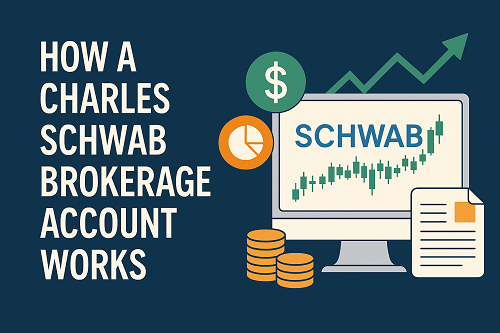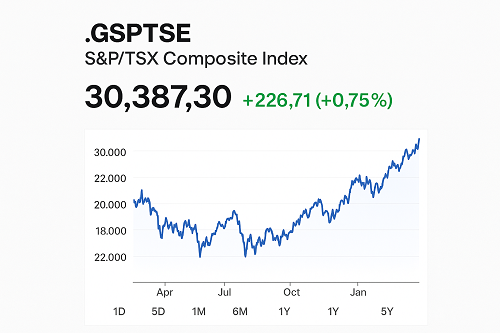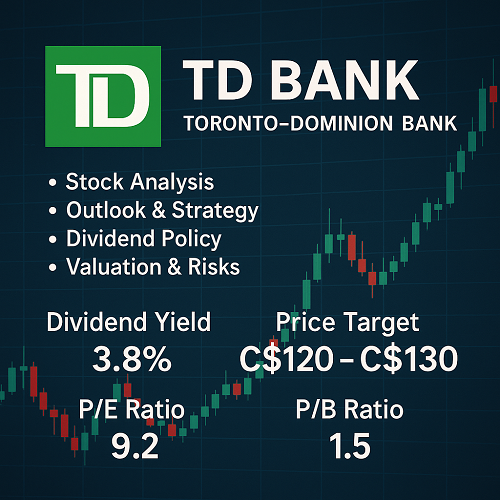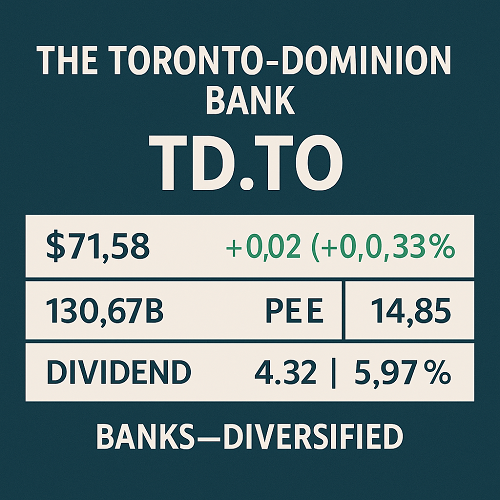A brokerage account is a taxable investment account (not tax-sheltered like an IRA) where you hold securities — stocks, bonds, ETFs, mutual funds, etc. The role of the brokerage is to execute trades, hold your assets, provide research and trading tools, and manage cash flow such as dividend payouts and interest.
As Schwab says:
“A brokerage account is an investment account that allows you to buy and sell a variety of investments, such as stocks, bonds, mutual funds, and ETFs.”
Key points:
- No fixed contribution limits (unlike IRAs).
- You can withdraw funds anytime (in most cases) though tax consequences may apply.
- Brokerage accounts do not provide the same tax advantages as retirement accounts (unless they’re held within an IRA wrapper).
Why choose Charles Schwab?
Here are the major reasons many investors pick Schwab:
a) Low cost & accessibility
- Schwab has $0 online U.S. stock and ETF commissions for many accounts.
- No minimum deposit for a standard brokerage account (though some specialized services do have minimums).
- Full suite of account types, investing tools, research resources.
b) Robust platform & services
- Schwab offers advanced platforms (such as the up-coming integration of the thinkorswim platform) for serious traders.
- Excellent educational materials and research support for beginner and intermediate investors.
- Banking and brokerage all in one (Schwab Bank + Schwab brokerage) for users who want integrated services.
c) Trust & scale
- Schwab is a large, regulated firm, subject to the rules of the U.S. Securities and Exchange Commission (SEC) and the Financial Industry Regulatory Authority (FINRA).
- Many reviews rate it highly for beginner friendly and full-service options.
In short: if you want a reliable brokerage that will scale with you (from beginner investing through more advanced trading) — Schwab is a strong contender.
How to open a Schwab brokerage account — step by step
Here’s how you typically set up a Schwab brokerage account:
- Decide the account type you need (see section 4).
- Visit Schwab’s website and start the application. You’ll need personal information such as:
- Social Security (or Tax ID)
- Mailing address, phone number, employment information
- Investment experience / objectives (for regulatory purposes)
- Select account features — e.g., margin trading, options capability (optional)
- Fund the account — Schwab allows you to fund by bank transfer (ACH), wire, check, or transfer from another brokerage.
- Once funded, you can begin investing/trading. Deposited funds (especially bank transfers) may have limited availability or holding periods. For example: Schwab says some electronic deposits may be available same day; some deposits may take up to five business days.
- Start trading using their website, mobile app, or advanced trading platform.
Pro tip: Even if you don’t invest immediately, open the account and link your bank first so you’re ready when you want to act.
Types of Schwab accounts you might use
While the “standard” brokerage account is the most common, Schwab offers multiple account types. Here are several:
- Individual taxable brokerage account: The most straightforward — you invest with after-tax dollars, and you owe taxes when you sell for a gain or receive dividends.
- Joint account: Two people hold the account together; useful for couples or business partners.
- Retirement accounts (IRAs): Traditional IRA, Roth IRA, Rollover IRA — with tax-advantaged status. Schwab offers these too.
- Custodial accounts: For minors (adult manages the account until minor reaches certain age).
- Managed/robo-advisor accounts: For example, Schwab’s “Intelligent Portfolios” (robo-advisor) has a minimum (often $5,000).
- Specialty accounts: 529 (education savings), small-business accounts, etc.
When a Reddit user asks “How does Schwab brokerage account work?”, they usually mean the standard individual taxable account — but knowing the spectrum of accounts helps you choose the right one.
Placing trades — stocks, ETFs, mutual funds, options, and more
Once you have your Schwab account open and funded, here’s how trading works:
a) Trading Stocks & ETFs
- Choose the asset (ticker symbol) you want to buy or sell.
- Pick the order type: market, limit, stop, stop-limit, etc. The Schwab FAQs cover these basics.
- Submit the order via website, mobile app, or desktop platform.
- Upon execution, the trade appears in your account holdings. You’ll see cost basis, market value, gains/losses.
b) Mutual Funds
- Schwab offers a large selection of mutual funds, including “no-transaction-fee” (NTF) funds.
- Some funds may carry loads or transaction/processing fees — you should check each fund individually.
c) Options & Other Instruments
- Schwab supports options trading (with per-contract fees) for qualifying accounts.
- Other instruments: bonds/fixed income, futures (on certain Schwab platforms), though crypto spot trading is not directly supported (more on that later).
- If you enable margin trading (borrowing to trade) you’ll have margin interest rates and additional risk (see section 8).
d) Cash & trade settlement
- When you buy, cash is debited; when you sell a position, usually trades settle in two business days (T+2) for stocks (common in the U.S.).
- You can typically use proceeds and available cash to place new trades immediately, though some funds may be on hold. Schwab states some deposits may take up to 5 business days before certain securities are tradeable.
Example workflow:
You open your Schwab account, link your bank, transfer $5,000. After funds settle, you log in, choose “Trade → Stocks & ETFs”, search symbol XYZ, submit a limit order at $50 for 100 shares. Once executed, you now own that position, it appears in your “Positions” tab, and you can track it, set alerts, etc.
Fees, commissions & hidden costs
One of the most-asked questions: “What does it cost?”
Commission and trading fees
- Online U.S. stock trades: $0 in many cases.
- ETFs: likewise commonly $0 commission.
- Options: base commission $0 but contract fee (e.g., $0.65 per contract) may apply.
- Mutual funds: many are no-transaction-fee (NTF) funds; some carry load or transaction fees.
- Other fees: broker-assisted trades (i.e., you call and ask someone to place the trade) may carry $25 or more.
Account maintenance / minimums
- Standard individual taxable accounts: typically $0 minimum deposit and $0 maintenance fee.
- Specialized accounts (robo-advisor, premium managed) have higher minimums.
Hidden/important considerations
- Margin rates: If you borrow on margin, the interest rate matters and may be higher than some dedicated margin brokers.
- Cash “sweep” or idle cash interest: The uninvested cash in your brokerage sits somewhere; the interest or yield may be low. Schwab’s default cash sweep rate has been criticized as relatively low.
- OTC (over-the-counter) stocks: These may carry extra fees (e.g., $6.95) compared to regular listed stocks.
- International trading: If you want to trade non-U.S. stocks or currencies, the fees and experience may differ.
- Tax implications: Capital gains tax, dividend tax etc. A brokerage like Schwab enables trades, but you are responsible for tax consequences.
Bottom line on cost
For many retail investors trading U.S. stocks and ETFs, Schwab offers a very competitive cost structure. You still need to check specifics if you trade options, margin, or exotic instruments.
Cash management, account protections, and “sweep” features
Beyond trading, your brokerage cash and protections matter.
Cash management / sweep program
When you deposit cash or receive dividends, that cash doesn’t automatically “sit there” earning high interest (unless you choose specific money-market or cash-equivalent funds). Schwab automatically sweeps idle cash into default accounts (bank or money-market) with low yield. Some users feel the interest on uninvested cash is sub-optimal.
If you want higher yield, you may need to select specific funds or switch providers.
Asset protection
- Schwab accounts are covered by the SIPC (Securities Investor Protection Corporation) up to certain limits (e.g., $500,000 for securities + $250,000 for cash in the event of broker failure) — note this does not protect against market losses.
- FDIC protection applies only to deposits at the bank arm (Schwab Bank) not to securities.
- Schwab is regulated by major authorities (SEC, FINRA) which adds credibility and oversight.
Withdrawal / deposit timeline
- Electronic deposits and wires into Schwab brokerage accounts: generally same day trading available, though some securities/deposits may be subject to up to five-business-day hold.
- Transfers-in from other brokerages (ACAT transfers) may take 3-7 business days depending on assets.
Advanced features: margin, options, fractional shares, robo-advisors
If you go beyond basic stock/ETF investing, Schwab offers more sophisticated tools — but with additional cost, risk, and complexity.
Margin trading
- When you enable margin, you borrow funds from Schwab to amplify your investing/trading.
- You’ll pay interest on the borrowed portion; you’ll face potential margin calls if your equity falls below required thresholds.
- Good for experienced traders only — risk of losses is higher.
Options & futures
- Available for qualifying accounts. Options cost (per contract) applies. Schwab’s platforms (including thinkorswim) are designed for advanced users.
- Futures and other derivatives may be supported on specific platforms/sub-accounts.
Fractional shares (“Stock Slices”)
- Schwab allows you to buy fractional shares of S&P 500 companies (starting at $5 minimum) via their “Stock Slices” program.
- Great for small dollar investors who want to dabble in expensive stocks.
Robo-advisor / Managed portfolios
- The “Schwab Intelligent Portfolios” offering builds and manages a diversified portfolio for you, based on your risk profile. Minimum $5,000 (or more) applies.
- Adds convenience but less control (and sometimes higher cost than DIY).
Automated rebalancing / tax-loss harvesting
- With the managed account option you may get automatic rebalancing and possibly tax-loss harvesting; DIY accounts you’ll have to manage these manually.
What Schwab doesn’t offer (or where competitors may beat it)
No brokerage is perfect — here are some areas where Schwab has limitations or where you should compare alternatives.
- Cryptocurrency spot trading: Schwab does not allow direct purchase of cryptocurrencies (Bitcoin, Ether, etc) at this time. They offer crypto-themed ETFs but not direct.
- Interest rates on idle cash: As noted, Schwab’s default cash sweep rate is relatively low compared to some high-yield alternatives.
- Fractional trading limitations: The “Stock Slices” program covers S&P 500 companies only; other brokers may offer broader fractional share access.
- Service cost for exotic investments: If you trade very frequently, use many margin/leverage, or trade international assets heavily, there may be better specialized brokers.
- UI/UX on mobile: Some beginner-friendly brokers boast more sleek mobile apps; Schwab’s mobile app is good, but some reviewers say for ultra-novice users there might be a steeper learning curve.
If your needs are very niche (crypto trading, extremely active futures day-trading, ultra-low cash yield), you may want to compare alternatives. But for many investors, Schwab hits a strong balance of cost, features, and reliability.
Real-life user tips, common pitfalls & what to watch out for
Here are practical tips drawn from user experiences and industry reviews (including forums like Reddit, although we’re going beyond that).
Tips
- Start by funding the account as soon as possible, even with a small amount — you’ll have access earlier when you’re ready to trade.
- Use limit orders, not always market orders — especially when trading large stocks or volatile ones.
- Monitor your cash sweep rate: if you have a lot of idle cash, consider moving it into higher-yield equivalents or invest it.
- Use Schwab’s research tools: take advantage of education, webinars, reports, especially if you’re newer to investing.
- Keep tax implications in mind: when you sell for a profit, or receive dividends, you’ll owe tax (capital gains tax, qualified dividends tax).
- Revisit your account type as you grow: maybe you start with basic, but later you might shift to a managed account or enable margin/options — only if comfortable.
- Beware of margin and options risk: For many, staying in cash or basic stocks/ETFs is sufficient.
Common pitfalls
- Holding too much idle cash with very low yield — you may be missing opportunity cost.
- Using market orders in thinly-traded stocks, leading to worse execution or unexpected slippage.
- Enabling margin or options before truly understanding the risk — losses can be magnified.
- Trading without a plan — treating the account like a gambling house rather than a disciplined investment vehicle.
- Ignoring tax rules (e.g., wash-sale rule if you’re doing aggressive trading).
- Assuming “$0 commission = free” — you still need to manage bid/ask spreads, currency conversion (if trading non-U.S.), and fund expenses.
What real Reddit users often ask
- “How long until my deposit is available to trade?” → Schwab says some funds are available same-day, others may have up to a five business-day hold.
- “Are there really no fees?” → While standard trades may be $0 commission, always check for contract fees (options), broker-assisted trades, mutual fund transaction fees, etc.
- “Is Schwab good for beginners?” → Yes — many reviewers rate it as strong for beginners due to low cost, robust education, and no minimums.
- “Can I trade crypto?” → Not directly. Schwab offers ETFs tied to crypto themes but not spot crypto tokens.
Summary: Is Schwab right for you?
If I were to sum it up:
- If you are a beginner or intermediate investor who wants a trusted brokerage with low costs, a broad set of features, and the ability to grow as you go — then Schwab is a very solid choice.
- If you are a very advanced trader seeking ultra-low margin rates, direct crypto trading, or extremely specialized markets, you might want to compare with niche brokers.
- If you have idle cash sitting in the brokerage that isn’t doing anything, be proactive to either invest or move it to a better yield.
- Use the tools and research Schwab offers — trading isn’t just about pressing a “buy” button, it’s about managing your portfolio, understanding risk, and aligning with your financial goals.
In essence: A Schwab brokerage account works by giving you access to invest in securities, trade them when you choose, hold cash, track your performance, and leverage tools/education — all within a regulated, reliable platform. As long as you understand the cost structure, stay aligned with your goals, and manage risk, it can serve you well.





 XAUT-USD
XAUT-USD AMD
AMD MARA
MARA SHOP
SHOP BULL
BULL CL=F
CL=F